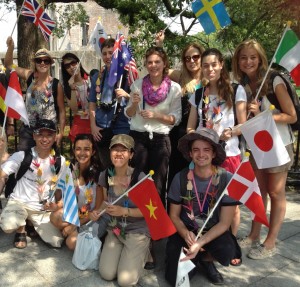 The INU Global Citizenship and Peace Master’s Summer School in Hiroshima was a fantastic experience and I would recommend anyone who is thinking of applying for the scholarship to do so.
The INU Global Citizenship and Peace Master’s Summer School in Hiroshima was a fantastic experience and I would recommend anyone who is thinking of applying for the scholarship to do so.
One of the most significant aspects of the course was the friendships made with other Master’s students from around the world. As a group of 12, we quickly developed strong friendships and stayed together as a group throughout the entire course. We were also lucky to have some great lecturers attend the course, including all the INU and Hiroshima University staff.
Dr Catherine Kevin from Flinders University and Professor Magnus Ericson from Malmo University took the Master student’s classes. The lectures provided an engaging forum for discussion between the students and teachers. The student panels were a fantastic way to get different perspectives and I really enjoyed listening to all the other student presentations as they were so diverse.
The Peace Memorial Ceremony in Hiroshima on August 6th was a once in a lifetime opportunity. The ceremony itself was rich with symbolism and respect for those who lost their lives and those who still suffer from the atomic bomb dropped on Hiroshima, 68 years ago. The silent prayer offered to the victims at 8.15am, the time that the bomb was dropped, was particularly poignant.
A stark reminder that remains in Hiroshima today is the Genbaku dome (atomic bomb dome). At the time of the bombing, this building was the Hiroshima Prefectural Industrial Promotion Hall located close to the hypocentre of the bomb. The shell of this building remained standing, although the explosion completely shattered the insides of the building. Today, this building remains to provide a reminder of the destructive forces of war and atomic weapons.
We were also very fortunate to hear a personal account from Mr Keijiro Matsushima, an atomic bomb survivor. His account of what happened on the 6th of August 1945 and how he survived the bomb was very honest. Despite the suffering that Mr Matsushima witnessed, his persona was lively and he stated that his mission is to continue to tell the story of that terrible day to prevent the use of a nuclear bomb on this earth again.
The intensive week of lectures, visiting the peace museum and attending the peace ceremony culminated in the UN General Assembly role play on the final day. I was placed in the USA country group with five other Master’s students and we were told to ‘act like our countries’. I found that ‘acting like our countries’ was a good way to understand the power dynamics and self- interested thinking of states.
The draft resolution provided for the role play was a set of ‘Sustainable Development Goals’ that were to replace the Millennium Development Goals in 2016. The goals used strong and decisive words like, ‘implement’, ‘answer for’ and ‘will have’ suggesting accountability and a requirement for states to actually do something about creating sustainable and equitable societies! Coming from a sustainable development background, I must admit it was a challenge to have to weaken these goals to create no accountability or commitments. But true to our allegiance to the USA, weaken them we did as well as trying to negotiate with other states to adopt the amendments that we wanted to be included in the resolution.
The negotiations were great fun and tricky at times, especially the point at which we came up against a BRIC block with China, India and Brazil (excluding Russia). Brazil managed to pass an amendment that developed economies would pay 0.8 per cent of their Gross National Income (GNI) to a global fund for sustainable development goals, while their economies paid nothing. The initial resolution was for 0.7 per cent of GNI from developed countries contributing to the fund. Despite our protestations that BRIC economies and emissions were growing and they should also contribute to a global fund for sustainable development, the 0.8 per cent amendment passed.
Overall, the INU summer school was a great experience that I would recommend to anyone thinking of attending. It was intensive, thought provoking, fun and a great way to experience Japan.

